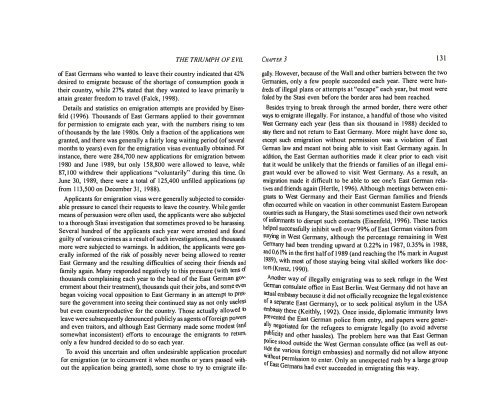austin-murphy-the-triumph-of-evil
austin-murphy-the-triumph-of-evil
austin-murphy-the-triumph-of-evil
You also want an ePaper? Increase the reach of your titles
YUMPU automatically turns print PDFs into web optimized ePapers that Google loves.
130 THE TRIUMPH OF EVIL<br />
<strong>of</strong> East Germans who wanted to leave <strong>the</strong>ir country indicated that 42%<br />
desired to emigrate because <strong>of</strong> <strong>the</strong> shortage <strong>of</strong> consumption goods in<br />
<strong>the</strong>ir country, while 27% stated that <strong>the</strong>y wanted to leave primarily to<br />
attain greater freedom to travel (Falck, 1998).<br />
Details and statistics on emigration attempts are provided by Eisenfe<br />
ld ( 1996). Thousands <strong>of</strong> East Germans applied to <strong>the</strong>ir government<br />
fo r permission to emigrate each year, with <strong>the</strong> numbers rising to tens<br />
<strong>of</strong>thousands by <strong>the</strong> late 1980s. Only a fraction <strong>of</strong> <strong>the</strong> applications were<br />
granted, and <strong>the</strong>re was generally a fa irly long waiting period (<strong>of</strong> several<br />
months to years) even for <strong>the</strong> emigration visas eventually obtained. For<br />
instance, <strong>the</strong>re were 284,700 new applications for emigration between<br />
1980 and June 1989, but only 158,800 were allowed to leave, while<br />
87, I 00 withdrew <strong>the</strong>ir applications "voluntarily" during this time. On<br />
June 30, 1989, <strong>the</strong>re were a total <strong>of</strong> 125,400 unfilled applications (up<br />
from 113,500 on December 31, 1988).<br />
Applicants for emigration visas were generally subjected to considerable<br />
pressure to cancel <strong>the</strong>ir requests to leave <strong>the</strong> country. While gentler<br />
means <strong>of</strong> persuasion were <strong>of</strong>ten used, <strong>the</strong> applicants were also subjected<br />
to a thorough Stasi investigation that sometimes proved to be harassing.<br />
Several hundred <strong>of</strong> <strong>the</strong> applicants each year were arrested and found<br />
guilty <strong>of</strong> various crimes as a result <strong>of</strong> such investigations, and thousands<br />
more were subjected to warnings. Jn addition, <strong>the</strong> applicants were generally<br />
informed <strong>of</strong> <strong>the</strong> risk <strong>of</strong> possibly never being allowed to reenter<br />
East Germany and <strong>the</strong> resulting difficulties <strong>of</strong> seeing <strong>the</strong>ir friends and<br />
family again. Many responded negatively to this pressure (with tens <strong>of</strong><br />
thousands complaining each year to <strong>the</strong> head <strong>of</strong> <strong>the</strong> East German government<br />
about <strong>the</strong>ir treatment), thousands quit <strong>the</strong>ir jobs, and some even<br />
began voicing vocal opposition to East Germany in an attempt to pressure<br />
<strong>the</strong> government into seeing <strong>the</strong>ir continued stay as not only useless<br />
but even counterproductive fo r <strong>the</strong> country. Those actually allowed to<br />
leave were subsequently denounced publicly as agents <strong>of</strong>foreign powers<br />
and even traitors, and although East Germany made some modest (and<br />
somewhat inconsistent) efforts to encourage <strong>the</strong> emigrants to return,<br />
only a few hundred decided to do so each year.<br />
To avoid this uncertain and <strong>of</strong>ten undesirable application procedure<br />
for emigration (or to circumvent it when months or years passed without<br />
<strong>the</strong> application being granted), some chose to try to emigrate ille-<br />
CHAPTER 3<br />
gaily. However, because <strong>of</strong> <strong>the</strong> Wall and o<strong>the</strong>r barriers between <strong>the</strong> two<br />
Gerrnanies, only a few people succeeded each year. There were hun<br />
dreds <strong>of</strong> illegal plans or attempts at "escape" each year, but most were<br />
foiled by <strong>the</strong> Stasi even before <strong>the</strong> border area had been reached.<br />
131<br />
Besides trying to break through <strong>the</strong> armed border, <strong>the</strong>re were o<strong>the</strong>r<br />
ways to emigrate illegally. For instance, a handful <strong>of</strong> those who visited<br />
West Germany each year (less than six thousand in 1988) decided to<br />
stay <strong>the</strong>re and not return to East Germany. More might have done so,<br />
except such emigration without permission was a violation <strong>of</strong> East<br />
German law and meant not being able to visit East Germany again. In<br />
addition, <strong>the</strong> East German authorities made it clear prior to each visit<br />
that it would be unlikely that <strong>the</strong> friends or families <strong>of</strong> an illegal emigrant<br />
would ever be allowed to visit West Germany. As a result, an<br />
emigration made it difficult to be able to see one's East German relatives<br />
and friends again (Hertle, 1996). Although meetings between emigrants<br />
to West Germany and <strong>the</strong>ir East German families and friends<br />
<strong>of</strong>ten occurred while on vacation in o<strong>the</strong>r communist Eastern European<br />
countries such as Hungary, <strong>the</strong> Stasi sometimes used <strong>the</strong>ir own network<br />
<strong>of</strong> informants to disrupt such contacts (Eisenfeld, 1996). These tactics<br />
helped successfully inhibit well over 99% <strong>of</strong> East German visitors from<br />
staying in West Germany, although <strong>the</strong> percentage remaining in West<br />
Germany had been trending upward at 0.22% in 1987, 0.35% in 1988,<br />
and 0.6 1% in <strong>the</strong> first half <strong>of</strong> 1989 (and reaching <strong>the</strong> 1% mark in August<br />
1989), with most <strong>of</strong> those staying being vital skilled workers like doctors<br />
(Krenz, 1990).<br />
Ano<strong>the</strong>r way <strong>of</strong> illegally emigrating was to seek refuge in <strong>the</strong> West<br />
German consulate <strong>of</strong>fice in East Berlin. West Germany did not have an<br />
actual embassy because it did not <strong>of</strong>ficially recognize <strong>the</strong> legal existence<br />
<strong>of</strong> a separate East Germany), or to seek political asylum in <strong>the</strong> USA<br />
embassy <strong>the</strong>re (Keithly, 1992). Once inside, diplomatic immunity laws<br />
P� vented . <strong>the</strong> East German police from entry, and papers were gener<br />
a<br />
u � � ��gohated for <strong>the</strong> refugees to emigrate legally (to avoid adverse<br />
P . •ctty and o<strong>the</strong>r hassles). The problem here was that East German<br />
�hce stood outside <strong>the</strong> West German consulate <strong>of</strong>fice (as well as out<br />
st<br />
e <strong>the</strong> various<br />
. foreign embassies) and normally did not allow anyone<br />
th<br />
Wt out pe · ·<br />
<strong>of</strong>Eas<br />
rmtsston to enter. Only an unexpected rush by a large group<br />
t Germans had ever succeeded in emigrating this way.


